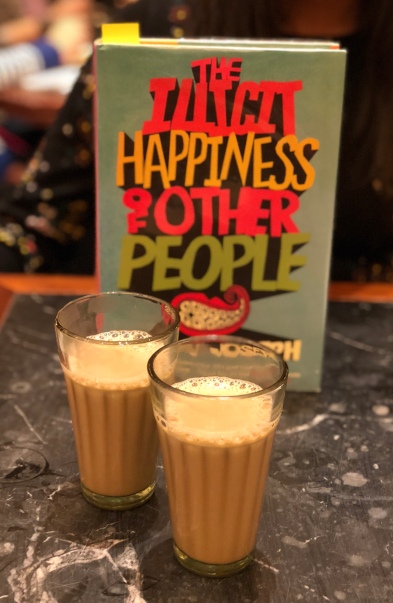There is a crowd outside the main door, talking softly about the death as if they don’t want the dead man to know that he is gone.

The Illicit Happiness of Other People is set in the late eighties in Madras, India. The prose follows Ousep Chacko’s quest to solve the mystery as to why his seventeen year son, Unni, jumped to his death from a balcony without any reason. The novel is not merely about the grief of a family. It is a dissection of human suffering, the delusions of happiness, and the hidden depths and identities of what is known, commonly, to be man.
Key characters include Ousep’s wife and youngest son and some flashback of Unni himself. His wife, Mariamma, who has frequent neurotic breakdowns and amongst other eccentricities, fantasises about Ousep’s death. The final member of the Chacko household, Thoma, is the youngest son tip toeing on adolescence whilst being firmly confined to a fear of most things in his life whilst crawling beneath the shroud of his brother’s greatness.
Although not alive from the prose point of view, Unni Chacko is very much the heart, soul and driving factor of the novel. Unni is a cartoonist, a popular teen and at a stretch, a social experimenter of sorts. There is no reason as to why someone like Unni would commit suicide, at least, not to Ousep. So when, by chance, one of Unni’s old comics is delivered to him, Ousep revives and puts to use the skills he gained as a journalist, to investigate why Unni died. Inadvertently, he sets out on a journey to discover an Unni he had no idea existed.
His journey includes tediously interviewing everyone he can associate and place with Unni at any time or place. The key issue for Ousep soon enough becomes to figure out who his son was, which he frankly, did not know. Joseph does not allow his readers to have one consistent view of Unni, which is not only an excellent literary style, he makes them uncomfortable in their views of this deceased minor. An example of such a situation would be when Unni instigates a mass lynching of a teacher at St Ignatius – I remember that particular point in the novel, where I was arguably the most uncomfortable.
I found Joseph’s dealings with the topic of mental health, rustic and very salt of the earth-esque. The primary character whose mental health is described unstable, is Mariamma. Not only is she dealing with the grief of her beloved son, but she also copes with other demons, suggested to be attributed to events earlier in her life. I liked the nuances, which Joseph pinpointed, that could be found in someone with a psychiatric diagnosis. The truth of illness, in this depiction, is that Mariamma has been running a house, finding work and somewhat assimilating in society. This is quite an important point – usual depictions of individuals with psychiatric diagnoses include ostentatious mannerisms, which can only be described as frantic chorea, which is of course, is not usually the case, and many people successfully manage their illness whilst assimilating in society. Mental health myth busted! Kudos, Joseph.
The book certainly has some excellent laughs, one of my favourite excepts is the dealings of mathematics, reflecting, perhaps, how the character feels about himself.
It affects him, the great arrogance of the Equilateral Triangle, the failed aspiration of the octagon to be a circle, the eternal suffocation of the denominator that has to bear the weight of the unjust numerator, the loneliness of Pluto. And the smallness of Mercury, always a mere dot next to a yellow sun. In this world, there is no respect for Mercury.
Joseph is an excellent writer – enough detail to give a great prose, but succinct where he needs to get a point. The cogs in the wheel of this tale are themes of identity, mental health, morality, sexuality, caste based discrimination – all underpinned by appropriate amounts of philosophy and enclosed in a frame of dark humour, with an unapologetic insight into the tragedies and dysfunction of humankind . A fantastic dark but uplifting tale.